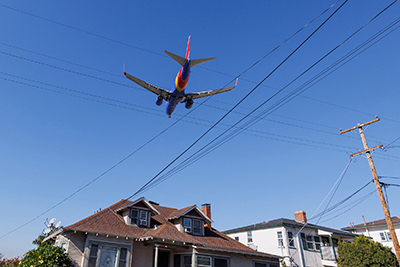“To be blunt, the nation’s commerce will grind to a halt,” the chief executives of major carriers warned in a letter.
By Chantal Da Silva
The aviation industry faces “catastrophic” disruption from the rollout of a new 5G service this week, airline leaders have warned.
In a letter sent Monday to United States transportation and economic officials and obtained by NBC News, the CEOs of major carriers said that the launch could ground flights and leave “tens of thousands of Americans” stranded overseas.
The warning came ahead of Wednesday’s rollout of the new C-Band 5G service from telecommunications giants AT&T and Verizon. It also comes as airlines continue to contend with the fallout from widespread flight cancellations fueled by the spread of the omicron variant of Covid-19 and a series of winter storms that caused travel chaos across the U.S.
The airlines warned that the 5G signals risked interfering with safety equipment pilots rely on to take off and land in inclement weather.
“Unless our major hubs are cleared to fly, the vast majority of the traveling and shipping public will essentially be grounded,” they said in the letter, which was signed by the chief executives of American Airlines, United Airlines, Delta Air Lines, Southwest Airlines and Jet Blue, along with leaders of UPS and FedEx.
“Immediate intervention is needed to avoid significant operational disruption to air passengers, shippers, supply chain and delivery of needed medical supplies,” the letter said.
Without clearance, it added: “To be blunt, the nation’s commerce will grind to a halt.”
The letter was addressed to National Economic Council Director Brian Deese, Transportation Secretary Pete Buttigieg, Federal Aviation Administration Administrator Stephen Dickson and Federal Communications Commission Chairwoman Jessica Rosenworcel.
Fifth-generation wireless technology, widely known as 5G, promises to deliver ultra-fast internet speeds, extra bandwidth and increased connectivity, with telecommunications companies around the world racing to roll out the service.
Both AT&T and Verizon have previously insisted that 5G networks operate safely without interference in nearly 40 countries and would do the same in the U.S. They declined to comment further on Monday.
The concern is that the airwave spectrum used by the 5G technology could clash with the signals used by radio altimeters, measuring instruments that help pilots determine the distance from the ground to the bottom of an aircraft during low visibility operations.
Both companies have agreed to maintain buffer zones around at least 50 airports to reduce the possibility of interference. And the Wednesday rollout of the new 5G service comes after an already two-week delay that was requested by the Department of Transportation in response to concerns from aviation leaders.
AT&T and Verizon initially rejected the government’s request in early January, but reversed course and agreed to the two-week delay.
At the time, Buttigieg said that talks between the FAA, major airlines and wireless carriers were “healthy.”
Airline leaders said they wanted the service to be rolled out “everywhere in the country except within the approximate 2 miles of airport runways at affected airports.”
“This will allow 5G to be deployed while avoiding harmful impacts on the aviation industry, traveling public, supply chain, vaccine distribution, our workforce and broader economy,” they said, suggesting that the 5G rollout could also potentially affect the distribution of Covid-19 vaccines.
As the 5G service goes live Wednesday, the FAA has said it will take the precaution of prohibiting pilots from using altimeters during landing at more than 80 airports near 5G sites. Major airports in Dallas, New York, Chicago and Seattle are among those expected to be affected.
The FAA said it would “continue to ensure that the traveling public is safe as wireless companies deploy 5G.”
“The FAA continues to work with the aviation industry and wireless companies to try to limit 5G-related flight delays and cancellations,” it added in a statement.
On Sunday, it said it had cleared an estimated 45 percent of the U.S. commercial fleet to “perform low-visibility landings at many of the airports where 5G C-band will be deployed” as of Wednesday.
But in a statement shared with NBC News, United Airlines said the federal government’s current 5G rollout plan would “have a devastating impact on aviation.”
The airline said the resulting chaos could potentially negatively affect as many as 1.25 million United passengers.
It said that airlines wanted the U.S. government to design policies to ensure that 5G technology can be safely deployed.
“We won’t compromise on safety — full stop. But, governments in other countries have successfully designed policies to ensure the safe deployment of 5G technology and we’re simply asking the U.S. government to do the same,” the airline said.
“We implore the Biden administration to act quickly and apply the same common sense solutions here that have clearly worked so well around the world,” it said.
